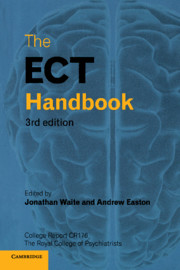Book contents
- Frontmatter
- Contents
- Abbreviations
- List of figures, tables and boxes
- List of contributors
- Preface
- Introduction: the role of ECT in contemporary psychiatry: Royal College of Psychiatrists’ Special Committee on ECT and Related Treatments
- 1 Mechanism of action of ECT
- 2 The ECT suite
- 3 Anaesthesia for ECT
- 4 ECT prescribing and practice
- 5 Psychotropic drug treatment during and after ECT
- 6 Monitoring a course of ECT
- 7 Non-cognitive adverse effects of ECT
- 8 Cognitive adverse effects of ECT
- 9 Dental issues related to ECT
- 10 Training, supervision and professional development: achieving competency
- 11 Nursing guidelines for ECT
- 12 Inspection of ECT clinics
- 13 Other brain stimulation treatments
- 14 The use of ECT in the treatment of depression
- 15 The use of ECT in the treatment of mania
- 16 The use of ECT in the treatment of schizophrenia and catatonia
- 17 The use of ECT in neuropsychiatric disorders
- 18 The use of ECT in people with intellectual disability
- 19 Safe ECT practice in people with a physical illness
- 20 ECT for older adults
- 21 The use of ECT as continuation or maintenance treatment
- 22 Consent, capacity and the law
- 23 Patients’ and carers’ perspectives on ECT
- Appendix I Out-patient declaration form
- Appendix II ECT competencies for doctors
- Appendix III Example of a job description for an ECT nurse specialist
- Appendix IV Example of a job description for an ECT nurse/ECT coordinator
- Appendix V Information for patients and carers
- Appendix VI Example of a consent form
- Appendix VII Useful contacts
- Appendix VIII Example of a certificate of incapacity
- Index
4 - ECT prescribing and practice
Published online by Cambridge University Press: 02 January 2018
- Frontmatter
- Contents
- Abbreviations
- List of figures, tables and boxes
- List of contributors
- Preface
- Introduction: the role of ECT in contemporary psychiatry: Royal College of Psychiatrists’ Special Committee on ECT and Related Treatments
- 1 Mechanism of action of ECT
- 2 The ECT suite
- 3 Anaesthesia for ECT
- 4 ECT prescribing and practice
- 5 Psychotropic drug treatment during and after ECT
- 6 Monitoring a course of ECT
- 7 Non-cognitive adverse effects of ECT
- 8 Cognitive adverse effects of ECT
- 9 Dental issues related to ECT
- 10 Training, supervision and professional development: achieving competency
- 11 Nursing guidelines for ECT
- 12 Inspection of ECT clinics
- 13 Other brain stimulation treatments
- 14 The use of ECT in the treatment of depression
- 15 The use of ECT in the treatment of mania
- 16 The use of ECT in the treatment of schizophrenia and catatonia
- 17 The use of ECT in neuropsychiatric disorders
- 18 The use of ECT in people with intellectual disability
- 19 Safe ECT practice in people with a physical illness
- 20 ECT for older adults
- 21 The use of ECT as continuation or maintenance treatment
- 22 Consent, capacity and the law
- 23 Patients’ and carers’ perspectives on ECT
- Appendix I Out-patient declaration form
- Appendix II ECT competencies for doctors
- Appendix III Example of a job description for an ECT nurse specialist
- Appendix IV Example of a job description for an ECT nurse/ECT coordinator
- Appendix V Information for patients and carers
- Appendix VI Example of a consent form
- Appendix VII Useful contacts
- Appendix VIII Example of a certificate of incapacity
- Index
Summary
Prescribing ECT
When should the course of ECT finish?
The aim of ECT should be remission of symptoms with a minimum of side-effects. Remission rates for those with severe, usually treatmentresistant depression are approximately 60–80% (Husain et al, 2004; Eranti et al, 2007). In a multicentre US study of thrice-weekly bitemporal ECT (n=253), a 30% decrease in symptoms after six treatments was found to predict final remission (Fig. 4.1) (Husain et al, 2004). The majority of these remissions occurred before the ninth treatment. However, 40% of patients who had not responded after six treatments went on to remission. So no definitive recommendation can be given to stop treatment in those who have failed to respond after six treatments. However, if after six satisfactory treatments there has been no clinical response whatsoever, clinicians may wish to reassess the need for ECT and consult with the patient, based on the decreased predicted response and remission rate for subsequent treatment (e.g. 40% v. 70% in the above study). If patients are failing to respond or are responding slowly, ECT teams should liaise further with referring clinicians regarding ECT dosing, medications, side-effects and any other reasons for modifying or stopping the treatment course. A patient who has had no response within 12 treatments is unlikely to have a sustained response to ECT.
How often should ECT be prescribed?
In addition to electrode placement, stimulus intensity and waveform (discussed later), the effectiveness of ECT is influenced by frequency of administration. Electroconvulsive therapy is usually given twice weekly in the UK, Ireland and several other European countries, whereas in the USA, thrice-weekly treatment is common practice. The UK ECT Review Group (2003) meta-analysis failed to find statistically significant differences between twice- and thrice-weekly bitemporal ECT with a fixed number of treatments (Kellner et al, 1992; Gangadhar et al, 1993; Lerer et al, 1995; Janakiramaiah et al, 1998; Shapira et al, 1998; Vieweg, 1998; UK ECT Review Group, 2003). There were trends showing thrice-weekly ECT to be no more effective than twice-weekly treatment but to have more cognitive side-effects. The clinical and cognitive outcomes of clinical trials in which patients are treated thrice weekly may not be fully applicable to routine UK practice.
Information
- Type
- Chapter
- Information
- The ECT Handbook , pp. 28 - 44Publisher: Royal College of PsychiatristsPrint publication year: 2013
